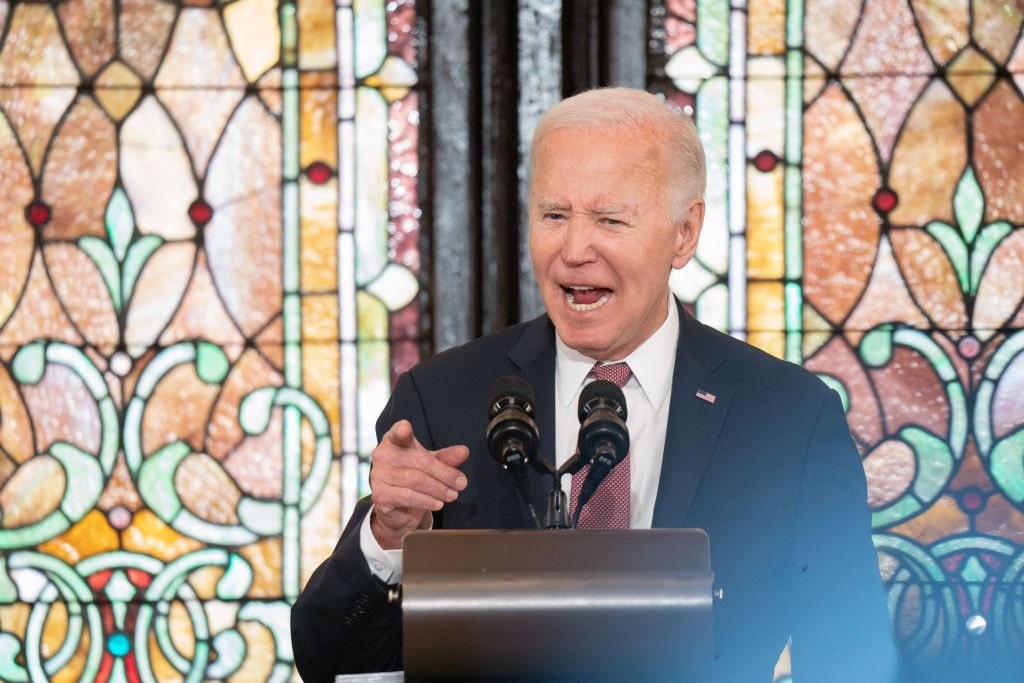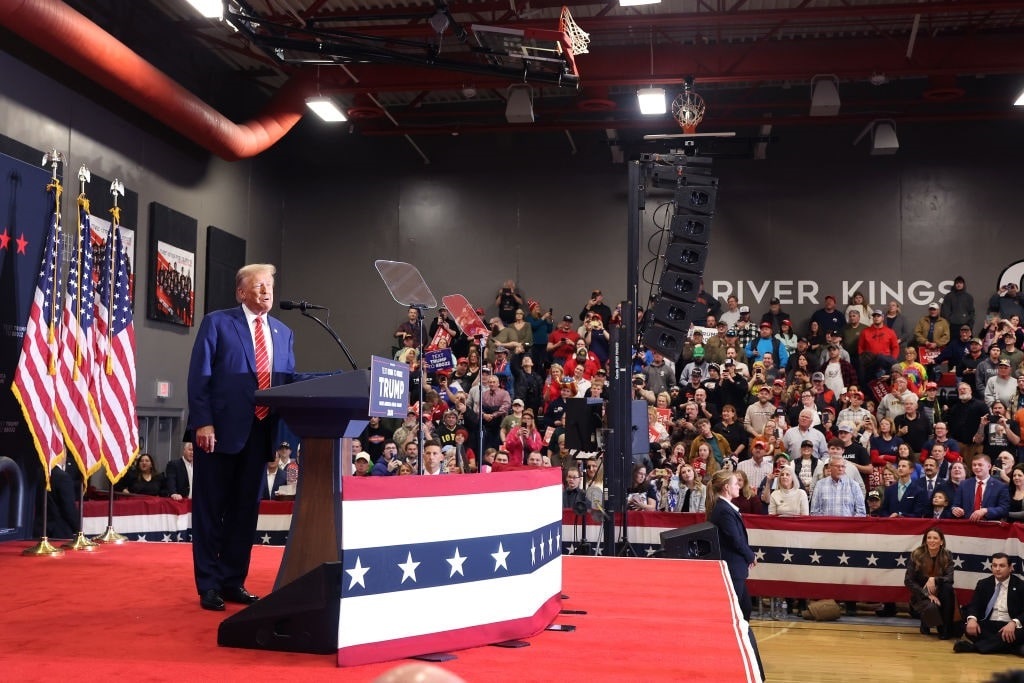With the first caucuses and primaries right around the corner, few folks are working half as hard as the handful of candidates running in the shadows of Donald Trump and Joe Biden. The pair of front-runners certainly aren’t in a desperate rush to glad hand in the early voting states. They don’t seem nearly as concerned about the primary process – and why should they be? With massive leads in their respective fields, the present and immediate past presidents simply don’t have to campaign like their “potential running mates,” most of whom will be called also-rans – if, indeed, they’re remembered at all.
Biden in the Swing States
President Biden kicked off the 2024 campaign year January 5 with a speech in Pennsylvania near the place George Washington famously overwintered during the Revolutionary War. The current commander-in-chief used the story of America’s first general, who went on to be America’s first president, as a launching pad for his anti-Trump speech. He spoke about how General Washington and his “rag-tag army made up of ordinary people” declared freedom, liberty, and democracy a sacred cause, then said Trump was willing to “sacrifice our democracy,” saying of the January 6, 2021, incident at the Capitol: “It was on that day we nearly lost America.”

Joe Biden (Photo by Sean Rayford/Getty Images)
Biden’s first campaign speech of the year focused almost entirely on Donald Trump and how he would surely seek to destroy the nation should he make a triumphant return to the White House next January. As Liberty Nation’s Graham J. Noble put it: “At least one can say that Joe Biden didn’t falsely claim he successfully handled the economy, border security, unemployment, or foreign policy. None of those subjects were mentioned.”
The president went on to speak at Mother Emanuel AME Church in Charleston, South Carolina, just a few days later on January 8. This time, he spoke on racism and implied that black voters are in danger from the white people of America should they fail to re-elect him. Though he spread his mudslinging and fearmongering a bit more broadly at the church – from the pulpit, no less – Biden didn’t leave out the standard lines about Trump the tyrant and the horrors of the great insurrection of January 6, the day he seems to think democracy nearly died.
By Friday, January 12, Biden was back in Pennsylvania, touring Allentown and the surrounding areas to tout Bidenomics and his alleged economic successes. A recent poll from Quinnipiac shows Biden and Trump close enough in the Keystone State that an election right this moment would be “too close to call.”
Polling shows the two political heavyweights essentially neck-and-neck in several swing states – which seems to be guiding Biden’s campaign toward focusing on fearmongering over Trump in these locales, with the South Carolina appearance being an attempt to drum up support among black voters. Trump beat Hillary Clinton in 2016 with just 6% of the black vote, and came quite close to beating Biden in 2020 with 8%. The New York Times reported, however, that 21% of black voters in six battleground states replied in a poll last fall that they planned to vote for Trump – which must have been terrifying news for Biden’s number crunchers.
But make no mistake – Biden is campaigning against Trump for the general election – not the other contenders buzzing about the primary fringes. In the latest polls collated by Real Clear Politics, Biden enjoys 69% of the Democrat vote in the primaries, at the national level. The other two listed contenders, Marrianne Williamson and Rep. Dean Phillips (D-MN), clocked just 5% and 4%, respectively. Even in New Hampshire, where Biden won’t appear on the primary ballot, he’s predicted to win by a large margin, raking in 49% as a write-in to Phillips’ 16%.
Trump’s Novel Campaign Approach

Donald Trump (Photo by Scott Olson/Getty Images)
Like his Democrat counterpart, Donald Trump – a former president, himself – is essentially running the campaign of an incumbent. The RCP Average shows him holding steady as the Republican front-runner at 61.1% nationally, with Nikki Haley coming in almost 50 points behind him at 11.3%. In Iowa alone, where the nation’s first caucus will soon take place, Trump maintains a healthy lead: 53% to Haley’s 17.8%. In fact, Trump’s biggest concern in Iowa isn’t winning; it’s winning by a record margin.
In 1988, Bob Dole defeated George H. W. Bush in the Iowa caucuses, which no one else has ever won by more than 12.8 points. “He would like to break that record,” state Rep. Bobby Kaufmann, a senior adviser to Trump’s Iowa campaign, said. And Don Jr. told voters in Marion, Iowa on Thursday: “We gotta treat Monday as though we’re ten points back.” If the former president’s 35-point polling lead translates to the ballot box, he has nothing to worry about there.
That he’ll win in Iowa and eventually pick up the GOP nomination, Trump seems to have no doubt. The former president’s campaign team projected last month that he is on track to formally land the national Republican presidential nomination by March 19. The team believes Trump can win 1,478 delegates by then, which would already be a majority of the 2,429 national delegates who will select the nominee at the Republican National Convention in July.
But while the rest of the GOP candidates are doubling down in Iowa – likely to no avail – Trump has taken his campaign nationwide in a couple of novel ways. Unlike his real opponent, Joe Biden, Trump isn’t sticking to swing states. A well-known sports fan, Trump attended fights and games regularly long before declaring any political aspirations. But looking ahead to the 2024 general election, the long-time fan has been using such sporting events as campaign stops. Aides say it puts their candidate in front of potential voters, many of whom may not follow politics very closely otherwise, and it’s far easier and cheaper than producing actual campaign rallies.
The former president has also been using the pressers after his numerous court appearances as impromptu campaign events, taking advantage of the free publicity and the fact that after each charge and indictment – and each time he’s seemingly abused by progressive judges in court – his popularity with the GOP base increases.
2024: Clash of the Titans
For all that the other Republican and Democrat candidates seem focused on primary events, almost everyone else in the nation seems to believe the general election will come down to Trump vs Biden. And it certainly seems likely that, once the national nominating conventions come and go, the “two incumbents” will have been correct all along.
By then, the only people who will really be able to upset the Trump and Biden apple carts will be so-called third-party candidates. And there are several: Chase Oliver of the Libertarian Party, Jill Stein of the Green Party, and then of course the independents, Cornel West and Robert F. Kennedy, Jr. And then there’s the No Labels Party, which reached out to Chris Christie after he canceled his Republican primary bid: Even if Christie doesn’t show any interest in a third-party run, No Labels is bound to have someone in the general election.
Oliver is predictable; he’ll pull some of the more libertarian votes from Trump. Stein is too; her votes would go to Biden if she weren’t running. Even Cornel West, running from the left of the current Oval Office occupant, will be drawing from the same pool as Biden and Stein.
But it’s Kennedy who seems likely to make the biggest splash – and pundits can’t quite seem to put their fingers on who he’ll hurt more. RFK, Jr. was a Democrat for many years, even initially running as a primary challenger to Biden. But his anti-vaccination, anti-Biden, closed-border, pro-voter ID talking points certainly tickle conservative ears.
Will Kennedy prove more of a spoiler for Trump or Biden? The answer may well determine which of the two wins his second term in November.

